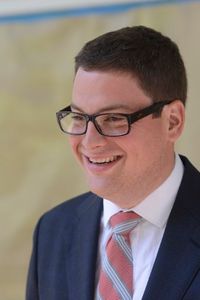Jacob Ringer
Jacob Ringer ran for election to the Chicago City Council to represent Ward 43 in Illinois. Ringer lost in the general election on February 26, 2019.
Ringer completed Ballotpedia's Candidate Connection survey in 2019. Click here to read the survey answers.
Ringer responded to Ballotpedia's unique candidate survey for 2019 Chicago candidates. The survey questions were developed with input from more than 100 Chicagoans in the months preceding the 2019 election. Here is one selected response:
"As a father and parent of 2 boys, Leo (age 3) and Henry (age 1), I've already been active and engaged in my local school community and I frequently attend Local School Council meetings. What is most important is that we have aldermen who are proactive in planning and forethought. We need a five-year plan to address local needs in every ward."
Click here to read more of Ringer's responses.
Elections
2019
See also: City elections in Chicago, Illinois (2019)
General runoff election
General runoff election for Chicago City Council Ward 43
Incumbent Michele Smith defeated Derek Lindblom in the general runoff election for Chicago City Council Ward 43 on April 2, 2019.
Candidate | % | Votes | ||
| ✔ |  | Michele Smith (Nonpartisan) | 53.6 | 7,435 |
 | Derek Lindblom (Nonpartisan) | 46.4 | 6,444 | |
| Total votes: 13,879 | ||||
 = candidate completed the Ballotpedia Candidate Connection survey. = candidate completed the Ballotpedia Candidate Connection survey. | ||||
| If you are a candidate and would like to tell readers and voters more about why they should vote for you, complete the Ballotpedia Candidate Connection Survey. | ||||
Do you want a spreadsheet of this type of data? Contact our sales team. | ||||
General election
General election for Chicago City Council Ward 43
The following candidates ran in the general election for Chicago City Council Ward 43 on February 26, 2019.
Candidate | % | Votes | ||
| ✔ |  | Michele Smith (Nonpartisan) | 39.0 | 5,486 |
| ✔ |  | Derek Lindblom (Nonpartisan) | 27.8 | 3,913 |
 | Leslie Fox (Nonpartisan)  | 13.4 | 1,892 | |
 | Jacob Ringer (Nonpartisan)  | 12.6 | 1,776 | |
 | Rebecca Janowitz (Nonpartisan)  | 4.8 | 681 | |
| Steven McClellan (Nonpartisan) | 2.3 | 325 | ||
| Total votes: 14,073 | ||||
 = candidate completed the Ballotpedia Candidate Connection survey. = candidate completed the Ballotpedia Candidate Connection survey. | ||||
| If you are a candidate and would like to tell readers and voters more about why they should vote for you, complete the Ballotpedia Candidate Connection Survey. | ||||
Do you want a spreadsheet of this type of data? Contact our sales team. | ||||
Withdrawn or disqualified candidates
- Matthew Roney (Nonpartisan)
Campaign themes
2019
Ballotpedia survey responses
See also: Chicago 2019 Candidate Survey
Jacob Ringer completed Ballotpedia's Chicago candidates survey for 2019. The survey questions appear in bold and are followed by Ringer's responses.
Low-income families do not have the same choices, options, or alternatives when it comes to public school. How can this be addressed?
a. As a father and parent of 2 boys, Leo (age 3) and Henry (age 1), I've already been active and engaged in my local school community and I frequently attend Local School Council meetings. What is most important is that we have aldermen who are proactive in planning and forethought. We need a five-year plan to address local needs in every ward. Our ward is lucky to have all tier one schools that have increasing enrollment. I will advocate for them to have all the resources they need to continue to provide an excellent neighborhood public education and the necessary capacity to serve all the students of the ward. I believe we need local school plans to do the same in every ward and to bring curriculum and programming from top neighborhoods to underperforming schools across the district.
How would you address inequality within and between schools?
a. I believe that every child in Chicago should be able to attend a high-quality neighborhood school and that means local solutions to local school issues and I do not support the closing of schools for short-term budget gains that create long-term problems. We also need some district-wide changes to address systemic issues. I think that we need to consolidate and simplify the byzantine system of school choice which is so difficult to navigate that it has spawned a cottage industry of high-priced consultants. We need to ensure that there is equal funding for students throughout the Chicago Public School system. I favor a City-wide moratorium on new charter schools until there is a complete and detailed assessment of our current school system. The public deserves to know the population of our schools, the condition of our building facilities, the capacity of the system, the number of seats in charters and the educational outcomes school-by-school. Standardizing programming so students can get the best education in their neighborhood school, with uniform performance standards and equal funding, would go a long way to addressing disparities in educational outcomes.
How can public schools better support their teachers and work more productively with the teachers’ union, parents, and the community?
a. I advocate for local five-year school plans to address priorities at the neighborhood level. I think that any such plan should include working collaboratively the teachers union, parents and other community stakeholders to come to evidence-based concrete evaluations and policies. All too often, local concerns get drowned out by the larger politicized conversation across the district. At the ward-level, I believe that we can be more productive because the community has greater knowledge of local issues and a greater stake in creating positive outcomes.
What do you believe are the greatest needs of kids in school today? How would you prioritize these needs and address them?
I believe we need local school plans to do the same in every ward and to bring curriculum and programming from top neighborhoods to underperforming schools across the district.
What are your proposals for supporting children before and after school? What would be your ideal afterschool programs?
a. The best before or after school program is the one that excites a student.
Do you believe that there is corruption in Chicago politics, such as pay-to-play practices when the city awards bids? If so, how would you address it?
a. I believe there is corruption in politics in general.
How would you make the city’s policies more responsive to community input instead of donors or special interests?
a. As alderman, I will create a more transparent process for community feedback, bringing back weekly ward night and open office hours. This ward is lucky to have seven different active neighborhood organizations and a unique character that must be maintained and nourished. I will be happy to listen to ideas from any quarter that can lead to good policy. I will be open to hearing from stakeholders like neighborhood groups, or individual community members so that decisions and policies reflect the voice of 43rd ward residents, not big donors. As a candidate, I have committed to not, not accepting mayoral contributions, or contributions from people who seek relief from the alderman’s office. I’ve also come out in support of public financing of elections and signed on to the People First Pledge, which includes a number of commitments to increase transparency and public accountability. I am also the first candidate in this race to commit to publicly post my answers to special interest questionnaires on my campaign website at www.Ringer4Results.com/issues, and the only one so far to follow through on it.
How would you handle the “recurrence of unaddressed racially discriminatory conduct by officers” identified in the U.S. Justice Department’s investigative report of the Chicago PD published in 2017?
a. I support an ordinance codifying into law the provisions of the consent decree which implements a suite of ideas designed to address bad conduct and would go a long way toward improving the perception of CPD in the community. I believe that the majority of police officers are hardworking and fair and have nothing to fear from improved training and oversight. This policy supports those officers and their relationship with the communities they serve by restoring the public trust and removing the bad apples that undermine or abuse that relationship.
What sort of proposals would help reduce police shootings and fatalities?
a. I think we should first recognize that no officer starts their day wanting to use their weapon and, on the contrary they’re most likely hoping they won’t have to. I want to support those officers and CPD in that goal, which is why I support evaluating and implementing improved use of force guidelines, department-wide training in de-escalation tactics, analysis and investigation of officer-involved shootings and continuous research into new ways to reduce future incidents.
What ideas do you have to reduce the availability of illegal or unregistered guns in Chicago?
a. I believe the best way to reduce the number illegal of guns is to focus on state legislation to regulate all gun dealers. This includes training of employees to recognize illegal straw sales before they occur. Additionally, 60% of illegal guns recovered in Chicago come from outside Illinois, a strong national background check system would help reduce this number. Regulations alone won't end our problems with gun violence--we need to create job training and education opportunities to prevent individuals from becoming involved in crime before it escalates to firearms.
How will you help to rebuild trust in the police department and to encourage the community to work with police?
a. We need police in our neighborhoods with consistent assignments so that they are truly integrated into the community. As a concerned citizen, I have made it a point to regularly attend CAPS meetings for over two years, far before my campaign began. This allowed me to get to know our beat officers, sergeants and other community members. However, had I not attended these meetings, I would not know our local officers, as our current policing strategy does not enable this. And that’s a real problem. There’s a major disconnect between our police and the communities they serve. CPD has even identified this is an issue that is hindering recruitment. Think about it, when was the last time you saw an officer walk down your block? I know my mail man, I know what sports teams he cheers for, my three-year-old son knows our street sweeper. Simply put, we need more police walking a beat and playing a bigger role in our community. Beat cops know when something is out of place and are in a better position to respond to crimes while they are happening and, more importantly, prevent it from happening in the first place. The bottom line is that our current policing strategy isn’t working and I’ve yet to see anyone in power take the steps needed to address it. We need more police and better training with a local focus. True community policing with a data-driven approach will not only address the scourge of rising crime but will also go a long way toward restoring trust and repairing the police-community relationship.
How would you address the displacement of people of color and long-term residents from their neighborhoods?
a. Ultimately, displacement has economic roots despite its racial effects. We can work to mitigate those effects by addressing the core problems through smart growth and economic development. I believe that we should support low-income residents with increased affordable housing, low-income tax breaks to limit the impact of gentrification, zoning changes that increase housing density and eliminating spot zoning which is often used to decrease density and build mini-mansions that drive up property taxes and property values. I recently participated in a press conference where I supported limits on aldermanic prerogative for affordable housing decisions because I support the goals of protecting affordable housing stock and improving housing security across the City as a solution to rising rents and economic inequality in Chicago. Increasing affordable housing stock and overall housing density are two ways to reduce pressure on rising rents and I support policies to achieve those outcomes. I support a mandate for affordable housing as part of developments and "in lieu of" fees only if the funds raised are used for actual affordable construction. For example, we have such a shortage of housing at this point and those funds can build more housing in other areas than it can here. We should have a mix of incentives for developers to use their skills to support CHA for building more affordable units on vacant land on and offsite and policies to ensure that there is an adequate supply of affordable family sized units available to families in the Section 8 program. Lastly, we need to work on economic and racial segregation, and to grow through broad-based economic development that will increase incomes so that more people can afford housing and I will always be listening and open to practical ideas to address this important issue.
How would you distribute revenue fairly between neighborhoods?
a. Revenue for infrastructure improvements and some ward services should be distributed based on the needs of each ward. For example, a large ward like the 10th on the far south side of Chicago currently has the same infrastructure budget as a medium-sized ward like my own but must use those funds to maintain streets in a geographical area roughly five times the size. With that being said, I believe that discretionary funds for infrastructure improvement need to be increased in all wards and that the City should take a greater role in a more centralized infrastructure management plan which would save money and relieve pressure on individual wards.
How do you propose to resolve the city’s underfunded pension plan for city employees?
Last year marked the last installment, $63 million, of the $589 million property tax increase voted on by the City Council in 2016. There is more pain to come; The City owes an additional $586 million annually to pension funds by 2022. In my time at the office of the Chief Financial Officer of the City I helped shine a spotlight on the unacceptable funding levels of our 4 pension funds and I understand this issue and the challenges we face. I worked with the first actuaries ever hired in the City of Chicago, unfortunately that wasn't until 2011. I strongly believe that the State – which passes pension laws that Chicago taxpayers must fund – should be part of the solution. City Council does not control the Illinois State Constitution or pension laws directly. However, under the current constitution, the Supreme Court has been clear and unequivocal in the right of City pensioners to receive their benefits. Until and unless that changes, pensions are a clear fiscal debt that the City of Chicago must pay for. The only way out of this problem is to bring in new revenue. We have to smart in how we do that. For example, I cannot believe that we are considering fiscally irresponsible pension obligation bonds. If the pension funds were to lose every cent of the pension obligation bond, taxpayers of Chicago would still be on the hook to pay for these obligations. Furthermore, the claimed arbitrage play is based on a rate of return set by the pension funds that has decreased in recent years and could fall even lower, thus eliminating any savings. If we don’t have leaders who understand City finances, we will continue to walk into traps like these. That is why we need my voice in City Council. I have a track record of delivering alternative revenue and I am the only candidate running anywhere in the City of Chicago who has delivered ongoing revenue without raising taxes, fines and fees. We need to look at every possibility to find alternative revenue sources like the digital billboard project I spearheaded when I worked for the City. That project is projected to bring in $250 million over 20 years without reaching deeper into the pockets of Chicago taxpayers. Some ideas for alternative revenue sources include a casino, recreational marijuana, taxing retirement income, video gambling, a limited commuter tax, and municipal marketing. I also believe that there are potential partial privatization deals that could lead to smart investment by the City. City Council must exercise strong public oversight to ensure that any revenue-generating proposals are considered transparently, and the final outcomes are in the best interests of the City and its residents. I think my understanding of City finances and the challenges ahead will be invaluable to appropriately evaluate future financial proposals.
What’s your opinion on tax increment financing (a program that funds development using any additional property tax revenue that results from an increase in appraised property values)? What, if any, changes would you make to the use of TIF?
I believe that reformed and carefully managed TIFs can be part of the solution to bring responsible economic development. TIFs should only be used to spur growth that would not have otherwise existed. I do believe future TIFs should expire upon completion of the project rather than on an arbitrary timescale. Current TIFs should be individually reviewed to determine their continued viability based on these criteria. We have an example of how TIF can contribute to a community with the Lincoln Yards development. I have long advocated for infrastructure to address traffic congestion, and I was excited to see five bridges in recent proposals from the developer. I also called for a new neighborhood school to receive the influx of population from the development and I was happy that the developer committed to a neighborhood school as well. Without the TIF associated with this project, I know the City would be hard-pressed to fund such major infrastructure improvements. As this process moves forward, I think it can get to a place where I can support it because of the value it will add to the neighborhood in terms of jobs and economic investment.
How would you assess the city's finances, and if your proposals would require new spending, how would you pay for them?
a. I will be a unifying voice in City Council, working with both new and current aldermen to explore new sources of revenue and creative solutions for more efficient government. My understanding of City finances and the challenges ahead will be invaluable to appropriately evaluate financial proposals. In my time working with the CFO of the City, I personally worked with many aldermen and government officials on legislation both in and around government and I know how to communicate and reach consensus. I am the only person running anywhere in the City who has delivered revenue without raising taxes, fines or fees. As the first Chief of Staff to the CFO of Chicago, I was uniquely situated between the Mayor’s office and the Department of Finance, I spearheaded the creation of digital billboards on the expressway. My digital billboard project brought in $25 million of revenue in its first year, has raised over $40 million to date, and is on target to raise over $250 million over the next 20 years. Working with six departments, Alderman, our business partners, and the State of Illinois, my unique approach to problem solving helped make this idea a reality and a reliable new revenue stream. As alderman, I will continue to proactively seek solutions like that.
Would you be in favor of freezing property taxes, at least for low-income households, so that people can stay where they are living?
a. I believe that we need to support and care for our most vulnerable residents. At the same time, we must protect the viability of City finances. I am open to revenue adjustments that are limited in scope and targeted to help the most vulnerable individuals as part of a comprehensive cost-neutral plan rather than an arbitrary rate freeze.
How would you increase access to quality food and urgent care in all parts of the city?
a. I believe that no one should go hungry, that healthcare is a human right, and that our public policies must reflect these values. In consideration of the City’s difficult financial realities, I believe we will need to attract the support of private industry partners through economic incentives and public funding at the federal level.
How will you address public health concerns such as contaminated drinking water, rat infestation, and lead poisoning?
I believe we should expand the Department of Water Managements’ current residential lead testing program to better understand the size and scale of the problem, but we should not wait on full understanding to start solving it. We need a clear plan in place with deadline for replacement of all lead water mains. We should also incentivize homeowners to replace their pipes leading to the main while the streets are open for water main replacement, thus reducing the costs to homeowners. As alderman, I will follow up on rodent abatement to ensure that it's completed. I will also work with property owners to allow them to abate rodents with support from the City. These kinds of partnerships, along with evaluating new methods for abatement such as feral cats, rodent birth control and continuing with dry ice, can stop Chicago from being the Rat Capital of the country.
How would you make Chicago a cleaner city with less waste and pollution?
I believe this start in the home and I have begun the process to install solar panels on my home. We need to re-evaluate the failed privatization of garbage and recycling. We need to be better at helping our environment and part of that is just making recycling more of a part of our day-to-day. I believe Chicago's recycling is unacceptable and we can improve in a number of ways but a good start is just by having our blue recycling cans picked up weekly just like our black cans to encourage residents to recycle and not be worried about the clutter.
What would be your first steps for improving the transit system in terms of affordability, accessibility, and safety?
I own a bike with a child seat, and I have a Divvy membership that I actively use with 545 lifetime trips to date, 45 trips this fall, and five this month. I love to have public transit and biking options that work for families like mine, but we just haven’t had the support from our current alderman and City Council for street level improvements to safety and reliability. With due consideration of City finances. I support improved transit and biking and walking alternatives and will use aldermanic menu funds to enhance funding for this in our ward.
Note: Ballotpedia reserves the right to edit Candidate Connection survey responses. Any edits made by Ballotpedia will be clearly marked with [brackets] for the public. If the candidate disagrees with an edit, he or she may request the full removal of the survey response from Ballotpedia.org. Ballotpedia does not edit or correct typographical errors unless the candidate's campaign requests it.
See also
2019 Elections
External links
Footnotes
| |||||||||








